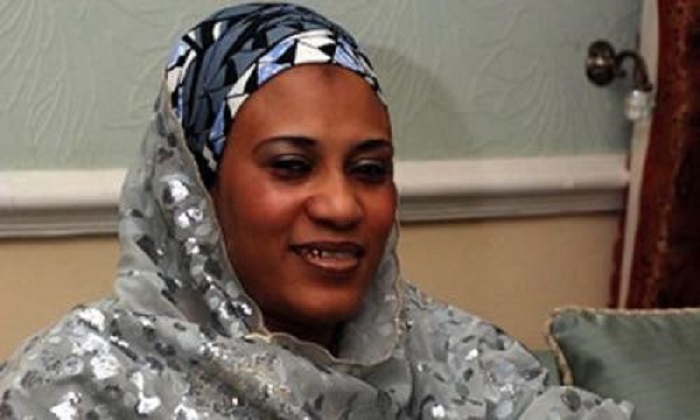Working as a resident journalist in some northern and southern states in Nigeria, gave me opportunities of seeing in close proximity, how persons in the corridors of power, particularly wives of Governors, exert influences with honour and notoriety. But let’s be very clear. I do not claim to know wives of all former and serving Governors in Nigeria. Nevertheless, I have, for nearly eight years, found in Hajiya Nana Shettima, three characters which to my mind, could make her the strange in a midst.
Have you ever imagined the possibility, that for eight solid years, the wife of an incumbent Governor in a country like Nigeria, the only wife for that matter, who despite carrying out series of humanitarian activities, did not for once issue instructions to any of her husband’s commissioners or heads of government agencies in attempt to exercise power? If this surprises you; well, so am I.
From 2011, when her husband, Kashim Shettima became Governor of Borno State, Hajiya Nana Shettima, it seems, made up her mind not to interfere with governance. I really don’t know how she did it but to date, none of the two successive secretaries to state government; none of the four heads of service, the two chiefs of staff, none of the dozens of commissioners, special advisers, permanent secretaries, directors, council chairmen and chief executives of agencies would claim to have received direct instructions from Nana Shettima to do anything. For eight years, that woman created and maintained a strange but dignified distance from the governance of Borno State.
Are you wondering how I got to know? It was the curiosity of being a journalist. I was hoping to see her difference from those I encountered during my reporting days. I aimed to write this article towards the end of her husband’s tenure. For these, I closely monitored her activities. I also employed news-gathering skills, by interviewing informally, many government officials.
It is incontrovertible, that as a Governor’s wife, Nana Shettima dealt only with her husband and restricted instructions to her aides. Though she inherited in 2011, a first lady’s, adjacent the Governor’s. In eight years, I am not sure Mrs Shettima entered that office a dozen times. She prefers to operate from home, where she places motherhood and wifehood, above ceremonial identity.
Perhaps, with the private support of her husband, she carried out numerous humanitarian and social activities in support of orphans and widows.
Doing these however, her only direct interactions with government officials was confined to inviting them for her humanitarian activities. Even then, her written invitations would normally be sent days ahead of events to differentiate invitations from sure notices dictatorial instructions. Oftentimes during her events, she makes her aides, take note of invited guests, including government officials. That’s not for handing to the Governor, a list of invited absentees, but for the decency of calling to thank those who attend her events and for sending them souvenirs.
Unlike what I have seen elsewhere, in which public office seekers go on pilgrimage to the first lady, Hajiya Nana Shettima neither sought nor encouraged ‘seeing’ her for public offices. In fact, by her countenance, she despised it. The woman had no business with anyone seeking appointment or elective office.
Openly though, she was for women and for that she fearlessly traveled by road to Chibok soon after the April, 2014 abduction. At that dangerous time, she could have been attacked on the road. Besides, insurgents had mines planted on that route. She couldn’t bear not visiting agonizing mothers. Also clear in Nana Shettima, is her ruggedness in political campaigns. She is tireless and efficient but these aren’t the other two strange things about her.
Aside refusing instruct government officials, Nana Shettima in eight years, maintained another strange character. She never dishonored her husband’s subordinates. From the deputy governor to Commissioners and everyone above or below, she regarded all.
Unusual of wives to men in power, not for once would you hear Nana Shettima address government officials by their names. For older persons, she would, while bowing, address them as ‘Baba na’ (which is my father) or ‘Mama na’ (my mother). For others, she uses the prefixes, ‘Uncle’ or ‘Aunty’ before their names. As an instance, she calls me ‘Uncle Isa’ disregarding the fact that I am but a bloody Special Adviser, down the rank in the tall order of those working for her husband.
Beyond calling me ‘Uncle Isa’, Hajiya Nana Shettima last week, did exhibit a stranger character.
She accompanied her husband, Governor Kashim Shettima on official trip to New Delhi, capital of India. In nearly eight years, it was the second time I saw her joined his official trips abroad. The first was to the United States back in 2014, which is our combined trip to Washington (for security meetings) and Nebraska State (for Irrigation equipment).
On knowing the Governor’s wife was on the trip to India, I prepared myself to help her with hand luggage. I hung a backpack, inside it, my working electronics. I was holding nothing. Free enough to carry Zuma Rock.
Hajiya Nana Shettima had a trolley bag as hand luggage. First, the Governor’s personal assistant, Barrister Mustapha Busuguma (an efficient deputy permanent secretary with reliability and sufficiency in secretarial and coordinating services) offered to help hold Mrs Shettima’s trolley bag. She cheerfully declined, telling Mustapha that he was already holding another trolley bag. I immediately offered, after all, I was holding nothing. “Uncle Isa, you are already carrying a computer bag on your back” she said laughing.
Throughout our trip, we kept pushing but she insisted on dragging her bag. It wasn’t that she was keeping the bag away for any content. In all transits at Addis Ababa, she specifically handed me the trolley bag, so she could go the airport mosque.
Nana Shettima was merely being herself- a Governor’s wife that is uniquely strange.
Gusau wrote this piece from Maiduguri.

 Join Daily Trust WhatsApp Community For Quick Access To News and Happenings Around You.
Join Daily Trust WhatsApp Community For Quick Access To News and Happenings Around You.

